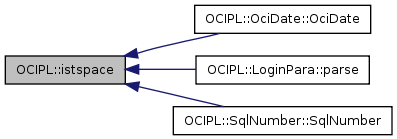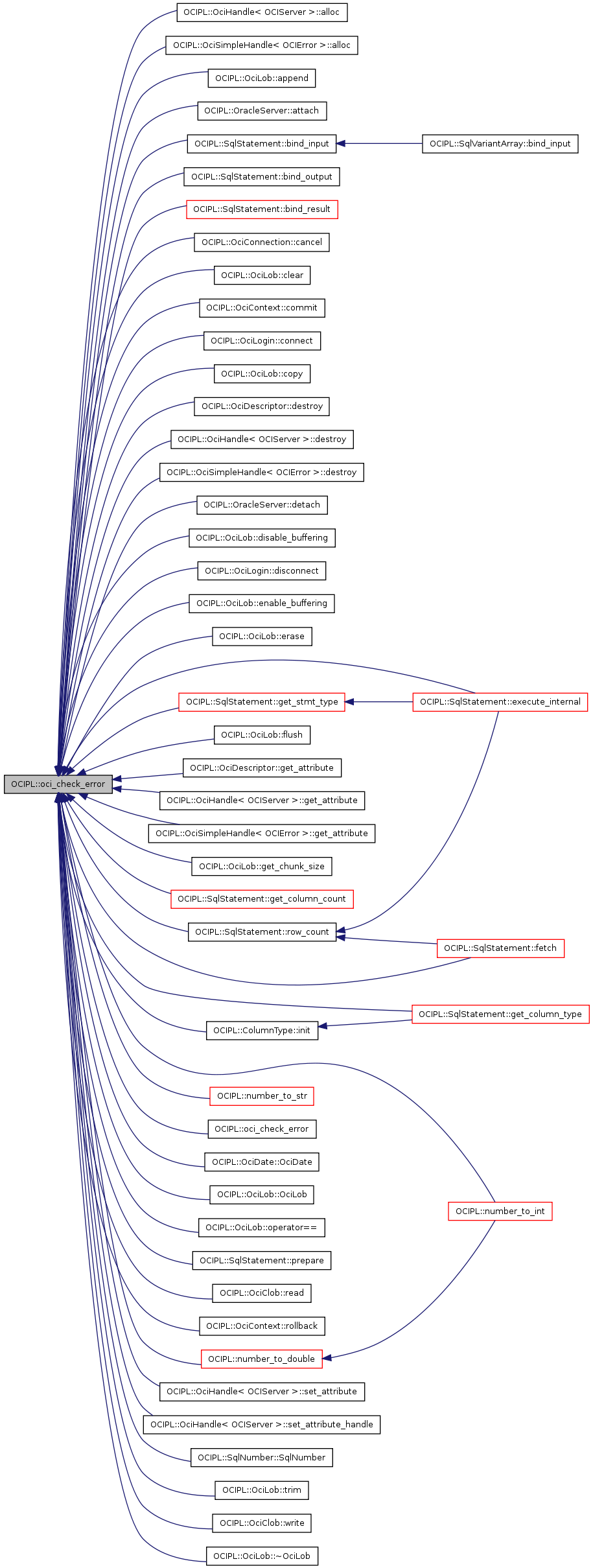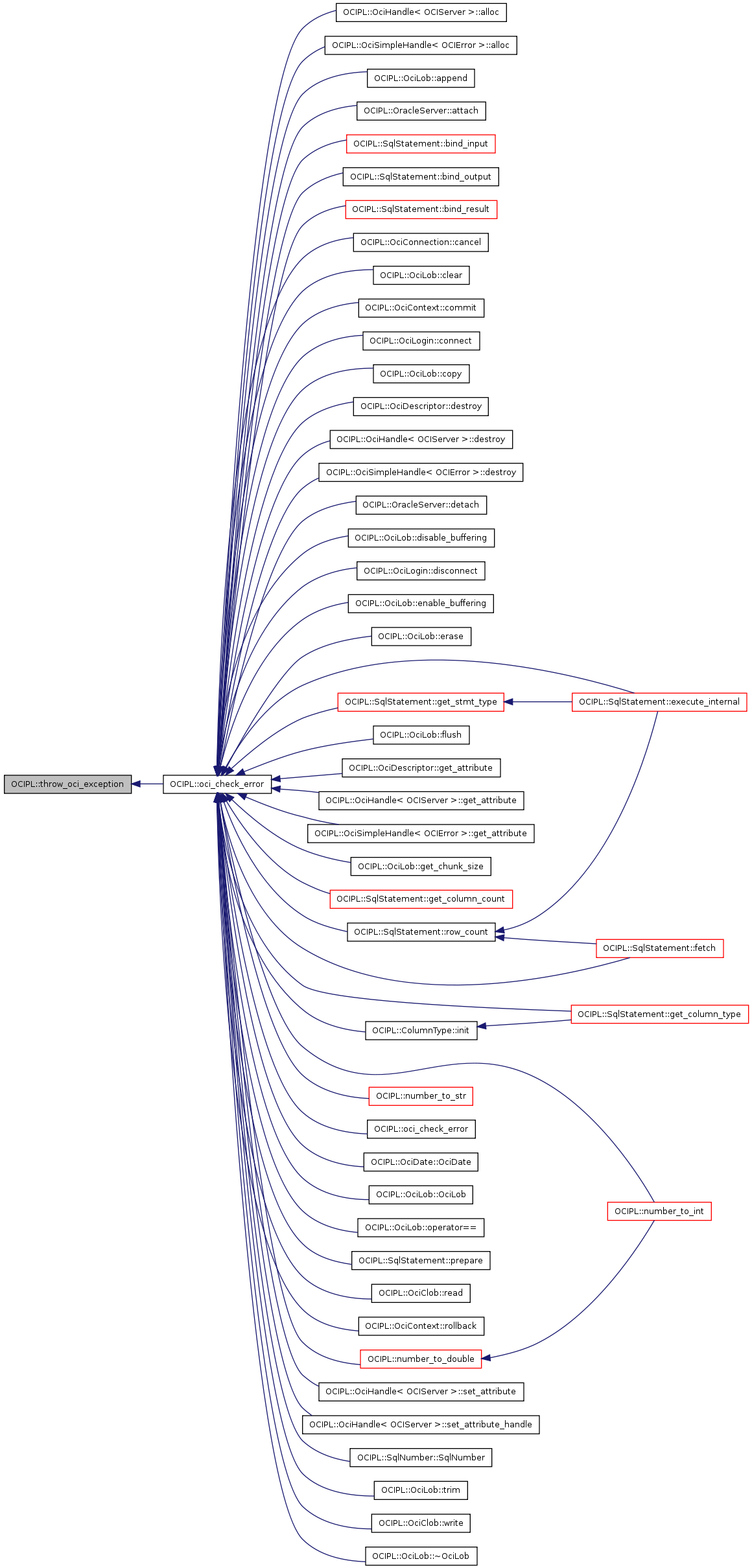Classes | |
| struct | OciException |
| OCI Error handling. More... | |
| struct | OciHandleID |
| mapping between OCI handle types and the corresponding type and attribute constants More... | |
| struct | OciSimpleHandle |
| "simple" OCI handles without OciEnv More... | |
| struct | OciHandleWrapper |
| wrapping of already existing OCI handles without freeing them in destructor More... | |
| struct | OciEnv |
| OCI environment handles. More... | |
| struct | OciEnvAlloc |
| wrapper for the OCIEnv handle More... | |
| struct | OciHandle |
| OCI handles. More... | |
| struct | OciDescriptor |
| OCI descriptor handles. More... | |
| struct | OracleServer |
| encapsulation of the OCIServer handle, used in OCIPL::OciLogin More... | |
| struct | LoginPara |
| database login parameter structure More... | |
| struct | OciContext |
| struct | OciLogin |
| simple OCI login to database More... | |
| struct | OciConnection |
| wrap OCIEnv and OCISvcCtx together More... | |
| struct | DatabaseConnect |
| DatabaseConnect to encapsulate all structures needed to connect to an Oracle database. More... | |
| struct | ColumnTypeInfo |
| column type information More... | |
| struct | ColumnType |
| column type description including name More... | |
| struct | SqlInd |
| Indicator variables are used to store information about the NULL-state of bind variables and result columns. More... | |
| struct | SqlValue |
| base class of bind variable structures containing the indicator variable More... | |
| struct | SqlIndArray |
| array of indicator variables More... | |
| struct | SqlInt |
| int wrapper with indicator variable More... | |
| struct | SqlIntArray |
| array of integer bind variable buffers More... | |
| struct | SqlString |
| string buffer bind variable structure More... | |
| struct | SqlStringArray |
| array of string bind variable buffers More... | |
| struct | ocidatetime |
| internal DATE representation More... | |
| struct | OciDate |
| wrapper for OCI DATE type More... | |
| struct | OciDateArray |
| OCI DATE type bind variable array. More... | |
| struct | SqlDateTime |
| wrapper for internal Oracle DATE type More... | |
| struct | SqlDateTimeArray |
| wrapper for internal Oracle DATE type More... | |
| struct | oraclenumber |
| internal NUMBER representation More... | |
| struct | SqlNumber |
| wrapper for internal Oracle NUMBER type More... | |
| struct | SqlNumberArray |
| array of NUMBER bind variable buffers More... | |
| struct | OciLob |
| base class for the BLOB/CLOB data holders OCIPL::OciLob and OCIPL::OciClob More... | |
| struct | OciClob |
| CLOB data holder structure. More... | |
| struct | BindInput |
| factory for call parameters of OCI bind functions More... | |
| struct | BindOutput |
| factory for call parameters of OCI bind functions More... | |
| struct | TrimBindPar |
| Binding of input strings with trimming to the specified maximum length. More... | |
| struct | DefinePar |
| factory for call parameters for OCI define functions More... | |
| struct | LocalOciState |
| struct | SqlStatement |
| an OCI SQL statement More... | |
| struct | SqlVariantArray |
| variant array to be used as bind variable buffer More... | |
| struct | SqlRecord |
| a record to hold return columns for a given statement More... | |
| struct | SqlResult |
| class to retrieve query result values More... | |
| struct | ResultIterator |
| iterator utilizing bulk mode fetching More... | |
Typedefs | |
| typedef OciSimpleHandle< OCIError > | OciError |
| OCI Error Handles. | |
| typedef OciSimpleHandle < OCIDescribe > | OciDescribe |
| OCI Describe Handles. | |
| typedef OciDescriptor< OCIParam > | OciParam |
| typedef OciHandle< OCIBind > | OciBindHandle |
| typedef OciHandle< OCIDefine > | OciDefineHandle |
Enumerations | |
| enum | OCI_STATE { OS_NONE, OS_PREPARE, OS_RELEASE, OS_EXECUTE, OS_FETCH, OS_TRANSACTION } |
| enum | { INT_NULL = -1 } |
Functions | |
| void | throw_oci_exception (OCIError *errh, sword res) |
| void | throw_oci_exception (OCIEnv *envh, sword res) |
| int | number_to_int (const oraclenumber &val, OCIError *errh) |
| double | number_to_double (const oraclenumber &val, OCIError *errh) |
| tstring | number_to_str (const oraclenumber &val, OCIError *errh, const TCHAR *fmt, const TCHAR *nls_fmt) |
| tstring | ocidate_to_string (const OCIDate &date) |
| tstring | ocidate_to_short_string (const OCIDate &date) |
| struct tm * | ocidate_to_gmt (const OCIDate &date) |
| struct tm * | ocidate_to_lctime (const OCIDate &date) |
| time_t | ocidate_to_time_t (const OCIDate &date) |
| tstring | ocidatetime_to_string (const ocidatetime &date) |
| const TCHAR * | get_oci_ptype_str (ub1 type) |
| static tstring | tokenize (const TCHAR **ptr, const TCHAR *sep) |
| static tstring | tokenize (const TCHAR **ptr, const TCHAR *sep, TCHAR key) |
| int | istspace (TCHAR c) |
| void | oci_check_error (OCIError *errh, sword res) |
| void | oci_check_error (OCIEnv *envh, sword res) |
| void | oci_check_error (OciEnv &env, sword res) |
| void | throw_ocipl_exception (OciException e) |
| This function is called to throw OCIPL Exceptions in response to Oracle Errors. | |
Variables | |
| int | g_OCIPL_BULK_ROWS = 100 |
Typedef Documentation
| typedef OciHandle<OCIBind> OCIPL::OciBindHandle |
| typedef OciHandle<OCIDefine> OCIPL::OciDefineHandle |
| typedef OciSimpleHandle<OCIDescribe> OCIPL::OciDescribe |
| typedef OciSimpleHandle<OCIError> OCIPL::OciError |
| typedef OciDescriptor<OCIParam> OCIPL::OciParam |
Enumeration Type Documentation
| enum OCIPL::OCI_STATE |
Definition at line 336 of file ocipl.h.
{
OS_NONE,
OS_PREPARE,
OS_RELEASE,
OS_EXECUTE,
OS_FETCH,
OS_TRANSACTION
};
Function Documentation
| const TCHAR * OCIPL::get_oci_ptype_str | ( | ub1 | type ) |
Definition at line 1978 of file ocipl.cpp.
References TEXT.
{
switch(type) {
case OCI_PTYPE_TABLE: return TEXT("table");
case OCI_PTYPE_VIEW: return TEXT("view");
case OCI_PTYPE_PROC: return TEXT("procedure");
case OCI_PTYPE_FUNC: return TEXT("function");
case OCI_PTYPE_PKG: return TEXT("package");
case OCI_PTYPE_TYPE: return TEXT("user-defined type");
case OCI_PTYPE_SYN: return TEXT("synonym");
case OCI_PTYPE_SEQ: return TEXT("sequence");
case OCI_PTYPE_COL: return TEXT("column");
case OCI_PTYPE_ARG: return TEXT("argument");
case OCI_PTYPE_LIST: return TEXT("list");
case OCI_PTYPE_TYPE_ATTR: return TEXT("user-defined type's attribute");
case OCI_PTYPE_TYPE_COLL: return TEXT("collection type's element ");
case OCI_PTYPE_TYPE_METHOD: return TEXT("user-defined type's method");
case OCI_PTYPE_TYPE_ARG: return TEXT("user-defined type method's argument");
case OCI_PTYPE_TYPE_RESULT: return TEXT("user-defined type method's result");
#if ORACLE_VERSION>=81
case OCI_PTYPE_SCHEMA: return TEXT("schema");
case OCI_PTYPE_DATABASE: return TEXT("database");
#endif
}
return TEXT("unknown type");
}
| int OCIPL::istspace | ( | TCHAR | c ) | [inline] |
Definition at line 290 of file ocipl.h.
Referenced by OCIPL::OciDate::OciDate(), OCIPL::LoginPara::parse(), and OCIPL::SqlNumber::SqlNumber().
{
#ifdef UNICODE
return _istspace((unsigned short)c);
#else
return isspace((unsigned char)c);
#endif
}

| double OCIPL::number_to_double | ( | const oraclenumber & | val, |
| OCIError * | errh | ||
| ) |
Definition at line 467 of file ocipl.cpp.
References oci_check_error().
Referenced by OCIPL::SqlNumberArray::get_double(), OCIPL::SqlNumber::get_double(), and number_to_int().
{
double x;
sword res = OCINumberToReal(errh, (OCINumber*)&val, sizeof(x), &x);
oci_check_error(errh, res);
return x;
}


| int OCIPL::number_to_int | ( | const oraclenumber & | val, |
| OCIError * | errh | ||
| ) |
Definition at line 423 of file ocipl.cpp.
References number_to_double(), and oci_check_error().
Referenced by OCIPL::SqlNumberArray::get_int(), and OCIPL::SqlNumber::get_int().
{
int x;
#if ORACLE_VERSION>=81
// Oracle Version >= 8.1.x
boolean isInt;
sword res = OCINumberIsInt(errh, (OCINumber*)&val, &isInt);
if (res==OCI_SUCCESS && isInt)
{
res = OCINumberToInt(errh, (OCINumber*)&val, sizeof(x), OCI_NUMBER_SIGNED, &x);
oci_check_error(errh, res);
}
else
#else
// OCI.DLL of Oracle Version 8.0
sword res = OCINumberToInt(errh, (OCINumber*)&val, sizeof(x), OCI_NUMBER_SIGNED, &x);
if (res != OCI_SUCCESS)
#endif
{
double d = number_to_double(val, errh);
x = int(d + .5);
}
//x = atoi(str(true).c_str());
return x;
}


| tstring OCIPL::number_to_str | ( | const oraclenumber & | val, |
| OCIError * | errh, | ||
| const TCHAR * | fmt, | ||
| const TCHAR * | nls_fmt | ||
| ) |
Definition at line 477 of file ocipl.cpp.
References _tcslen, oci_check_error(), and TCHAR.
Referenced by OCIPL::SqlNumberArray::str(), and OCIPL::SqlNumber::str().
{
OraText buffer[128];
ub4 l = sizeof(buffer);
sword res = OCINumberToText(errh,
(OCINumber*)&val,
(const OraText*)fmt, (ub4)_tcslen(fmt)*sizeof(TOraText),
(const OraText*)nls_fmt, (ub4)_tcslen(nls_fmt)*sizeof(TOraText),
&l, buffer);
oci_check_error(errh, res);
// const TCHAR* p = (const TCHAR*)buffer;
// while(istspace(*p))
// ++p;
return (const TCHAR*)buffer;//p
}


| void OCIPL::oci_check_error | ( | OCIError * | errh, |
| sword | res | ||
| ) | [inline] |
Definition at line 724 of file ocipl.h.
References throw_oci_exception().
Referenced by OCIPL::OciHandle< OCIServer >::alloc(), OCIPL::OciSimpleHandle< OCIError >::alloc(), OCIPL::OciLob::append(), OCIPL::OracleServer::attach(), OCIPL::SqlStatement::bind_input(), OCIPL::SqlStatement::bind_output(), OCIPL::SqlStatement::bind_result(), OCIPL::OciConnection::cancel(), OCIPL::OciLob::clear(), OCIPL::OciContext::commit(), OCIPL::OciLogin::connect(), OCIPL::OciLob::copy(), OCIPL::OciDescriptor< TYPE >::destroy(), OCIPL::OciHandle< OCIServer >::destroy(), OCIPL::OciSimpleHandle< OCIError >::destroy(), OCIPL::OracleServer::detach(), OCIPL::OciLob::disable_buffering(), OCIPL::OciLogin::disconnect(), OCIPL::OciLob::enable_buffering(), OCIPL::OciLob::erase(), OCIPL::SqlStatement::execute_internal(), OCIPL::SqlStatement::fetch(), OCIPL::OciLob::flush(), OCIPL::OciDescriptor< TYPE >::get_attribute(), OCIPL::OciHandle< OCIServer >::get_attribute(), OCIPL::OciSimpleHandle< OCIError >::get_attribute(), OCIPL::OciLob::get_chunk_size(), OCIPL::SqlStatement::get_column_count(), OCIPL::SqlStatement::get_column_type(), OCIPL::SqlStatement::get_stmt_type(), OCIPL::ColumnType::init(), number_to_double(), number_to_int(), number_to_str(), oci_check_error(), OCIPL::OciDate::OciDate(), OCIPL::OciLob::OciLob(), OCIPL::OciLob::operator==(), OCIPL::SqlStatement::prepare(), OCIPL::OciClob::read(), OCIPL::OciContext::rollback(), OCIPL::SqlStatement::row_count(), OCIPL::OciHandle< OCIServer >::set_attribute(), OCIPL::OciHandle< OCIServer >::set_attribute_handle(), OCIPL::SqlNumber::SqlNumber(), OCIPL::OciLob::trim(), OCIPL::OciClob::write(), and OCIPL::OciLob::~OciLob().
{
if (res != OCI_SUCCESS)
throw_oci_exception(errh, res); // doesn't throw an exception for res==OCI_SUCCESS_WITH_INFO
}


| void OCIPL::oci_check_error | ( | OCIEnv * | envh, |
| sword | res | ||
| ) | [inline] |
Definition at line 731 of file ocipl.h.
References throw_oci_exception().
{
if (res != OCI_SUCCESS)
throw_oci_exception(envh, res); // doesn't throw an exception for res==OCI_SUCCESS_WITH_INFO
}

| void OCIPL::oci_check_error | ( | OciEnv & | env, |
| sword | res | ||
| ) | [inline] |
Definition at line 738 of file ocipl.h.
References OCIPL::OciEnv::_errh, and oci_check_error().
{
oci_check_error(env._errh, res); // doesn't throw an exception for res==OCI_SUCCESS_WITH_INFO
}

| struct tm * OCIPL::ocidate_to_gmt | ( | const OCIDate & | date ) | [read] |
Definition at line 670 of file ocipl.cpp.
Referenced by OCIPL::OciDateArray::get_gmt(), and OCIPL::OciDate::get_gmt().
{
struct tm ltime = {
date.OCIDateTime.OCITimeSS,
date.OCIDateTime.OCITimeMI,
date.OCIDateTime.OCITimeHH,
date.OCIDateDD,
date.OCIDateMM - 1,
date.OCIDateYYYY - 1900,
-1,
-1,
-1
};
time_t time = mktime(<ime);
assert(time!=-1);
#ifdef __STDC_WANT_SECURE_LIB__
struct tm newtime;
gmtime_s(&newtime, &time);
struct tm* gmt = &newtime;
#else
struct tm* gmt = gmtime(&time);
#endif
return gmt;
}

| struct tm * OCIPL::ocidate_to_lctime | ( | const OCIDate & | date ) | [read] |
Definition at line 698 of file ocipl.cpp.
Referenced by OCIPL::OciDateArray::get_lctime(), OCIPL::OciDate::get_lctime(), and ocidate_to_time_t().
{
struct tm ltime = {
date.OCIDateTime.OCITimeSS,
date.OCIDateTime.OCITimeMI,
date.OCIDateTime.OCITimeHH,
date.OCIDateDD,
date.OCIDateMM - 1,
date.OCIDateYYYY - 1900,
-1,
-1,
-1
};
time_t time = mktime(<ime);
assert(time!=-1);
#ifdef __STDC_WANT_SECURE_LIB__
struct tm newtime;
localtime_s(&newtime, &time);
struct tm* lct = &newtime;
#else
struct tm* lct = localtime(&time);
#endif
return lct;
}

Definition at line 655 of file ocipl.cpp.
References _stprintf, COUNTOF, TCHAR, and TEXT.
Referenced by OCIPL::OciDateArray::short_str(), and OCIPL::OciDate::short_str().
{
TCHAR buffer[40];
#ifdef __STDC_WANT_SECURE_LIB__
_stprintf_s(buffer, COUNTOF(buffer),
#else
_stprintf(buffer,
#endif
TEXT("%02d.%02d.%04d"),
date.OCIDateDD, date.OCIDateMM, date.OCIDateYYYY);
return buffer;
}

Definition at line 639 of file ocipl.cpp.
References _stprintf, COUNTOF, TCHAR, and TEXT.
Referenced by OCIPL::OciDateArray::str(), and OCIPL::OciDate::str().
{
TCHAR buffer[40];
#ifdef __STDC_WANT_SECURE_LIB__
_stprintf_s(buffer, COUNTOF(buffer),
#else
_stprintf(buffer,
#endif
TEXT("%02d.%02d.%04d %02d:%02d:%02d"),
date.OCIDateDD, date.OCIDateMM, date.OCIDateYYYY,
date.OCIDateTime.OCITimeHH, date.OCIDateTime.OCITimeMI, date.OCIDateTime.OCITimeSS);
return buffer;
}

| time_t OCIPL::ocidate_to_time_t | ( | const OCIDate & | date ) |
Definition at line 726 of file ocipl.cpp.
References ocidate_to_lctime().
Referenced by OCIPL::OciDateArray::get_time_t(), and OCIPL::OciDate::get_time_t().
{
time_t time = mktime(ocidate_to_lctime(date));
assert(time!=-1);
return time;
}


| tstring OCIPL::ocidatetime_to_string | ( | const ocidatetime & | date ) |
Definition at line 762 of file ocipl.cpp.
References _stprintf, OCIPL::ocidatetime::century, COUNTOF, OCIPL::ocidatetime::day, OCIPL::ocidatetime::hour, OCIPL::ocidatetime::minute, OCIPL::ocidatetime::month, OCIPL::ocidatetime::second, TCHAR, TEXT, and OCIPL::ocidatetime::year.
Referenced by OCIPL::SqlDateTimeArray::str(), and OCIPL::SqlDateTime::str().
{
TCHAR buffer[40];
#ifdef __STDC_WANT_SECURE_LIB__
_stprintf_s(buffer, COUNTOF(buffer),
#else
_stprintf(buffer,
#endif
TEXT("%02d.%02d.%04d %02d:%02d:%02d"),
date.day, date.month, 100*(date.century-100)+(date.year-100),
date.hour-1, date.minute-1, date.second-1);
return buffer;
}

| void OCIPL::throw_oci_exception | ( | OCIEnv * | envh, |
| sword | res | ||
| ) |
Definition at line 122 of file ocipl.cpp.
References THROW_OCI_EXCEPTION.
{
switch(res) {
case OCI_ERROR:
case OCI_NO_DATA:
case OCI_INVALID_HANDLE:
THROW_OCI_EXCEPTION(envh);
//@todo handle other error states
}
}
| void OCIPL::throw_oci_exception | ( | OCIError * | errh, |
| sword | res | ||
| ) |
Definition at line 105 of file ocipl.cpp.
References THROW_OCI_EXCEPTION.
Referenced by oci_check_error().
{
switch(res) {
case OCI_ERROR:
case OCI_NO_DATA:
THROW_OCI_EXCEPTION(errh);
break;
case OCI_INVALID_HANDLE:
THROW_OCI_EXCEPTION("invalid handle");
break;
//@todo handle other error states
}
}

| void OCIPL::throw_ocipl_exception | ( | OciException | e ) |
This function is called to throw OCIPL Exceptions in response to Oracle Errors.
You can plug in your own version instead by implementing and linking another throw_ocipl_exception() function.
Definition at line 55 of file ocithrow.cpp.
Referenced by OCIPL::SqlStatement::execute_internal().
{
throw e;
}

| static tstring OCIPL::tokenize | ( | const TCHAR ** | ptr, |
| const TCHAR * | sep, | ||
| TCHAR | key | ||
| ) | [static] |
| static tstring OCIPL::tokenize | ( | const TCHAR ** | ptr, |
| const TCHAR * | sep | ||
| ) | [static] |
Definition at line 2007 of file ocipl.cpp.
References _tcslen, _tcspbrk, and TCHAR.
Referenced by OCIPL::LoginPara::parse(), and tokenize().
{
const TCHAR* start = *ptr;
const TCHAR* end;
const TCHAR* found = _tcspbrk(*ptr, sep);
if (found) {
end = found;
*ptr = found;
} else
*ptr = end = start + _tcslen(start);
return tstring(start, end-start);
}

Variable Documentation
| int OCIPL::g_OCIPL_BULK_ROWS = 100 |

 1.7.2
1.7.2